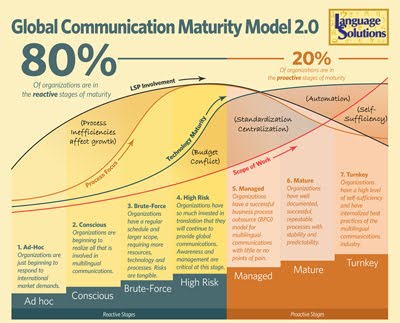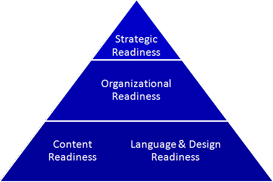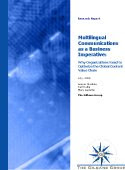A self-assessment audit for your global communication needs can be a valuable tool to determine your current situation, to set goals and to find areas of improvement that have the most impact. However, most assessment tools that we have seen provide solutions but do not focus on the leading indicators that impact your localization practices.
There are Language Service Providers (LSP's) that can help you determine your needs for global communications and most likely they promote the use of technology through their audits. Tools like Translation Memory Management, Terminology Management, Source Authoring are all good tools to improve the efficiency of your localization practices, but do not provide all the answers. Most Language Service Providers can take care of translation management using these tools. However, the success of each project is limited by their own Key Performance Indicators (KPI) and how they manage their own processes.
Our approach does not only look at our internal Key Performance Indicators for translation management, but also assesses how a client's processes can positively influence or negatively impact the localization process. Those are the leading indicators that a client can influence in order to improve quality and time-to-market at lower costs.
Most audits do not take into account that every organization is at a different stage of maturity and need scalable solutions. Even if you are a large company, your global communication needs currently might not be comprehensive enough to invest in large scale technologies like a full scale Source Authoring system or Content Management System. Technology is not the only answer for organizations to influence the quality of their global communication needs. You need to look at people and processes that have a direct impact on the localization processes.
The global communications process can be time consuming which is why most organizations outsource to a Language Service Provider. Some of these Providers have the resources and processes in place to effectively manage your translation process and keep that burden from your internal resources who have their own work to do. However, the impact that your internal resources have to affect the localization process should not be ignored. We promote involvement of people in all levels of your organization to find efficiencies in their own processes that have a positive impact on localization.
Our audit focuses on internal resources at all levels of the organization to determine how they can help improve their own processes to aid translation management on the client side. We identified 4 areas of assessment (Strategic, Organizational, Content and Language & Design) and identified roles within those areas that directly impact the global communications process. The assessment promotes each individual in the organization to contribute to the globalization process without having to step outside of their own responsibilities.
Contact us for our Global Readiness Audit. We are taking the next step for organizations at any maturity level to identify areas of improvement that yield the highest results.
There are Language Service Providers (LSP's) that can help you determine your needs for global communications and most likely they promote the use of technology through their audits. Tools like Translation Memory Management, Terminology Management, Source Authoring are all good tools to improve the efficiency of your localization practices, but do not provide all the answers. Most Language Service Providers can take care of translation management using these tools. However, the success of each project is limited by their own Key Performance Indicators (KPI) and how they manage their own processes.
Our approach does not only look at our internal Key Performance Indicators for translation management, but also assesses how a client's processes can positively influence or negatively impact the localization process. Those are the leading indicators that a client can influence in order to improve quality and time-to-market at lower costs.
Most audits do not take into account that every organization is at a different stage of maturity and need scalable solutions. Even if you are a large company, your global communication needs currently might not be comprehensive enough to invest in large scale technologies like a full scale Source Authoring system or Content Management System. Technology is not the only answer for organizations to influence the quality of their global communication needs. You need to look at people and processes that have a direct impact on the localization processes.
The global communications process can be time consuming which is why most organizations outsource to a Language Service Provider. Some of these Providers have the resources and processes in place to effectively manage your translation process and keep that burden from your internal resources who have their own work to do. However, the impact that your internal resources have to affect the localization process should not be ignored. We promote involvement of people in all levels of your organization to find efficiencies in their own processes that have a positive impact on localization.
Our audit focuses on internal resources at all levels of the organization to determine how they can help improve their own processes to aid translation management on the client side. We identified 4 areas of assessment (Strategic, Organizational, Content and Language & Design) and identified roles within those areas that directly impact the global communications process. The assessment promotes each individual in the organization to contribute to the globalization process without having to step outside of their own responsibilities.
Contact us for our Global Readiness Audit. We are taking the next step for organizations at any maturity level to identify areas of improvement that yield the highest results.










